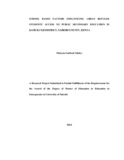| dc.description.abstract | This study investigated school based factors influencing urban refugee access to public secondary school in Kamukunji District Nairobi County. The objectives of the study were: To determine whether the language of instruction in schools influences urban refugee access to secondary education, to establish the role of living conditions of urban refugee on education accessing secondary education, to establish how cost of education influences urban refugee access to secondary school and to identify the extent to which certification regulation by the Government of Kenya influence refugee access to secondary education. The study adopted descriptive survey design. Participants were selected using purposive and simple random sampling and the study sampled 7 school principals and 196 refugee students. Descriptive statistics were used for data analysis and results presented using tables, frequencies, pie charts and bar graphs. The study identified that majority of the urban refugees in public secondary schools and their siblings in Kamukunji District miss school because of un cleared or lack of school fees. The study therefore concluded that high cost of education affect the urban refugee students‘ access to secondary education in the district and recommends that the schools should identify potential donor scholarships to help them clear their school fees. Majority of the urban refugee students and their siblings miss the certification documents and therefore to a large extent the certification regulations affect their access to secondary education. The study recommends that the government ought to provide a special center for issuing certification documents to the urban refugee students. A big number of the urban refugee students are affected by the language of instruction and therefore it negatively influences their access to secondary education. The study therefore recommends that tuition classes could be appropriate and language departments should organize formal assistance to the urban refugee students. The study found out that majority of the urban refugee student parents are in the informal sector of employment and therefore concluded that living conditions negatively affect their access to secondary education. The study recommends that urban refugee parents to be given work in the schools to help them raise their living conditions. The major research conclusions are that language of instruction, poor living conditions, lack of school fees, lack of school documents required on entry to secondary school and finally the Kenya Education certification policy to a great extent influences access to secondary school. The recommendation for this study is that the government should increase the number of public schools for girls so as to cater for high demand of secondary education also incorporate refugees parents with prior skills into vocational training, job placement programs or grants programming aiming to establish small enterprises so that they can improve their livelihood. The suggestions for further studies on school based factors that influence urban refugee girls‘ access to public secondary schools in and also non school related factors influencing the dropout rates of urban refugee students. | en_US |

